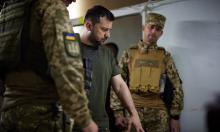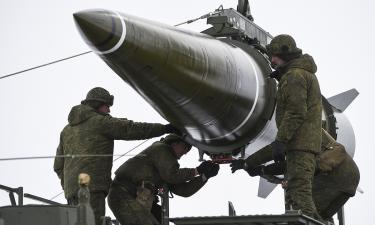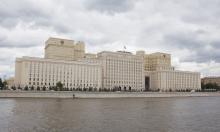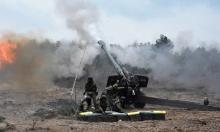Explosion rips through bus carrying civilians and Lebanese military men, killing 18
A bomb ripped through a bus carrying civilians and members of the Lebanese military during Wednesday morning rush hour in the northern city of Tripoli, killing 18 people and wounding 46, security officials said.
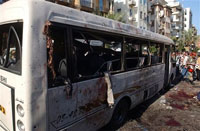
The officials said the dead included 10 off-duty soldiers.
The bomb was planted on the side of a main street and went off as the bus passed by. The streets were filled with people heading to work, which contributed to the many casualties, the officials said.
The security officials spoke on condition of anonymity because they were not authorized to speak to the media.
The blast raised suspicions that al-Qaida-inspired Islamic militants may have sought revenge on the military for its assault last year on the nearby Palestinian refugee camp of Nahr el-Bared, a one-time bastion of the Fatah Islam group. The monthslong battle killed hundreds and eventually drove out Fatah Islam.
The army described the blast as a "terrorist attack targeting the army directly." A senior military officer told The Associated Press that at least 13 people were killed, including 11 soldiers. He spoke on condition of anonymity for the same reason.
The discrepancy with the higher police figures could not immediately be explained.
The blast also came hours before Lebanese President Michel Suleiman was to begin a visit to Syria to patch up stormy relations between the neighbors - the first visit by a Lebanese president to Syria in three years.
Prime Minister Fuad Saniora, whose national unity Cabinet was approved by parliament Tuesday after months of political wrangling, said the attack "will not affect the launching of our government."
"Lebanon and the Lebanese will not kneel ... or submit to the criminals and the terrorists," said Saniora, but refrained from linking the blast to Syria, as he had done on previous occasions.
Syria denounced the explosion and expressed support for Lebanon "against the hands that try to mess with its security and stability," according to a statement by the foreign ministry in Damascus.
Shattered glass littered Banks Street in Tripoli's center, as soldiers and policemen cordoned off the area to keep onlookers away and to investigate.
The small public bus, which had been bringing passengers from the remote, northernmost Akkar region, home to many military members, was riddled with shrapnel. Soldiers used sniffer dogs to search nearby parked cars, as forensic experts in white uniforms, face masks and gloves sifted through the wreckage of the bus in search of evidence.
Experts determined the bomb was locally made and packed in a bag with nuts and bolts to maximize impact. It contained 3.3 pounds (1.5 kilograms) of high-explosive TNT and was triggered by remote control, security officials said.
Electrician Hatem Hussein, 24, said he ran to the scene after hearing the loud explosion. "The wounded were lying on the ground, men in military uniforms," he said.
Another witness, Khaled Bizri, 38, said he didn't have the "courage to look at the dead," who included a popular street vendor who sold bread, Abu Ayman. "Everybody knew him. This was his place for 30 years."
Tripoli, about 50 miles (90 kilometers) north of Beirut on the Mediterranean coast, is Lebanon's second-largest city and has a mostly Sunni Muslim population dominated by groups loyal to the Western-backed parliamentary majority.
Despite a relative calm elsewhere, it has in the past weeks witnessed sectarian clashes between Sunni fighters and followers of the Alawite sect, an offshoot Shiite sect, that killed and wounded dozens of people.
Last Friday, about 2,000 supporters of Islamist groups protested in Tripoli to demand the release of prisoners suspected of plotting or carrying out militant attacks in Lebanon.
Former Prime Minister Omar Karami - a prominent politician from Tripoli - said it is too early to know the motive, but said the attack could be linked to the 2007 Nahr el-Bared violence, given the high casualties among soldiers.
Fatah Islam group claimed responsibility for a bomb blast that killed a soldier in Abdeh, near Tripoli, on May 31.
Lebanon has seen a series of explosions in the last 3 1/2 years, including the 2005 truck bombing that killed former Prime Minister Rafik Hariri in Beirut, an explosion that sparked the political and security upheaval in the country.
But there have been no serious attacks against politicians or public places since February.
The latest violence comes at an especially sensitive time for Lebanon, with its freshly approved Cabinet in which the Iranian-backed Hezbollah opposition has more say in the running of the country, including veto power over major decisions.
The Arab Laegue in Cairo, Egypt, and the European Union's official for foreign relations, Benita Ferrero-Waldner, also condemned Wednesday's explosion.
Subscribe to Pravda.Ru Telegram channel, Facebook, RSS!


